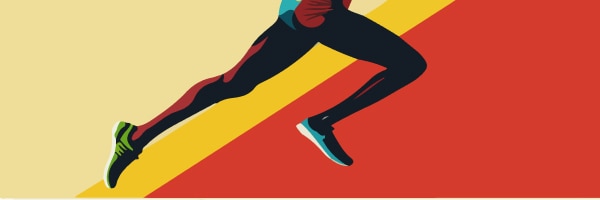AncestryDNA® Traits
Athletic Ability

Were you the child who excelled at every sport you tried, the one who struggled at all of them, or somewhere in between? You may have been born with genetics that gave you a leg up in the competition or that made it harder to compete. But even if you don't see yourself as competitive by nature, your general athletic ability and inclination—to go for a long walk or to swim laps, for example—can still be influenced by your genetics.
If you're curious about your natural athletic ability, AncestryDNA® + Traits can help you discover what your DNA indicates.
Is There Such a Thing as a Natural Athlete?
Some people think athletes have an athletic gene that boosts them to success. While there's some truth to this statement, it's not the whole of the story, by far. There's no such thing as a single athletic gene. Instead, some people have a genetic influence on their athletic performance, priming their bodies to excel at sport. For example, the genes ACTN3 and ACE are both linked to strength and endurance, affecting the fibre type within muscles. Heart rate recovery, muscle fatigue, and other genetically influenced traits also play a role in whether someone can tolerate the extreme levels professional athletes push their bodies to.
Beyond looking at the relationship between genetics and sport performance, psychological factors also help athletes perform. The field of sport psychology even focuses on these factors, acknowledging the key traits likely to help or hurt athletes on the field through mental training. These include factors such as:
- Perfectionism
- Fear of failure
- Confidence
- Focus
- Emotional regulation
- Goal-setting
- Leadership
Genetics and Athleticism
Ancestry® scientists interested in genetics and athletic ability performed a genome-wide association study, surveying over 401,000 people who took an AncestryDNA test. They asked participants, "How would you rate your natural athleticism?" Comparing participants' responses with their DNA data, scientists found over 708 DNA markers related to natural athletic ability. Using these findings, the scientists calculated a polygenic risk score—a tool to predict your natural athleticism based on your genetics.
Overall, the science shows that this fitness and sport performance trait is very complex. It's many different genes working together to shape your propensity for athleticism—a group of "athlete genes"—not a single gene that's responsible for it. The genetic components that influence oxygen use and risk taking, for example, are also likely to influence your athletic ability. Likewise, general athletic prowess also involves traits like balance and coordination, physical agility, strength, and speed—all of which can be connected to hundreds of overlapping or unique genetic markers.
What Else Influences Athletic Performance?
Importantly, factors other than your genetics play a major role in your athleticism. In fact, Ancestry scientists found that differences in people's DNA could only explain a small amount of the variation in their self-reported athleticism—about 10%. That means non-genetic, or "environmental" factors influence athleticism much more than genetics.
Experiences like having an older sibling, being older than your classmates, and having a strong support network can all influence your athletic ability. All sorts of factors come into play here, for instance, as children, younger siblings are typically smaller and weaker than their older siblings. They have to work harder to keep up with older siblings and tend to develop key skills necessary for athletic success, such as tenacity. Additionally, having a strong social support network helps athletes prevent burnout.
Interesting Facts About Athletic Ability
Environmental factors that might seem initially irrelevant can influence athletic ability. Studies reveal that professional athletes across the United States and Canada are likely to come from cities with a population between 50,000 and 100,000 people. Researchers believe this could be because smaller cities tend to have more access to open spaces conducive to practicing sports than highly populated areas. Conversely, data reveals that rural areas with populations of 1,000 or less produce fewer professional athletes than expected. Rural areas tend to lack infrastructure that allows for competitive play with peers.
Interested in the relationship between your genetics and athleticism? Find out more about your overall athletic potential and how your genes may influence this with AncestryDNA® + Traits. If you've already taken a test, you can review those traits online with your Ancestry® membership.
References
-
Bahna, Cassidy. "The little-sibling effect on athleticism." Rowland Hall. November 26, 2022. https://www.rowlandhall.org/gazette/story/~board/stories/post/the-little-sibling-effect-on-athleticism
"Do small towns produce the biggest athletic talent?" Queen's University, Arts and Science. December 15, 2021. https://www.queensu.ca/artsci/news/do-small-towns-produce-the-biggest-athletic-talent.
Guth, Lisa M. and Stephen M Roth. "Genetic influence on athletic performance." Current Opinion in Pediatrics. December 2013. doi:10.1097/MOP.0b013e3283659087.
Katagami, Eriko, and Hironobu Tsuchiya. "Effects of Social Support on Athletes' Psychological Well-Being: The Correlations among Received Support, Perceived Support, and Personality." Psychology. November 2016. doi: 10.4236/psych.2016.713163.
"Sports Psychology." American Psychological Association. Accessed May 1, 2024. https://www.apa.org/ed/graduate/specialize/sports.
Voorhees, Carolyn C., David Murray, et al. "The role of peer social network factors and physical activity in adolescent girls." American Journal of Health Behavior. 2005. doi:10.5993/ajhb.29.2.9. https://www.ncbi.nlm.nih.gov/pmc/articles/PMC2507875/.